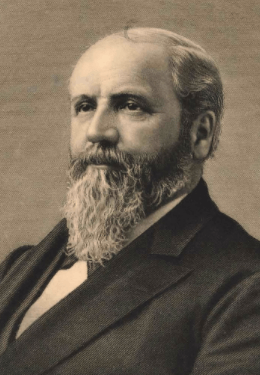Clinton B. Fisk facts for kids
Quick facts for kids
Clinton Fisk
|
|
|---|---|
 |
|
| Personal details | |
| Born |
Clinton Bowen Fisk
December 8, 1828 York, New York, U.S. |
| Died | July 9, 1890 (aged 61) New York City, New York, U.S. |
| Political party | Prohibition |
| Spouse | Jeannette C. Crippen |
| Children | 3 |
| Parents |
|
| Education | Hillsdale College |
| Signature | |
| Military service | |
| Allegiance | |
| Branch/service | Union Army |
| Years of service | 1862–1865 |
| Rank | |
| Unit | 33rd Missouri Volunteer Infantry Army of the Tennessee |
| Battles/wars | American Civil War |
Clinton Bowen Fisk (born December 8, 1828 – died July 9, 1890) was an important leader after the American Civil War. He worked with the Freedmen's Bureau, an organization that helped formerly enslaved people. He also ran for president in 1888 as the candidate for the Prohibition Party, which wanted to ban alcohol. Fisk University was named after him because he gave a large donation of $30,000 to help it start. He also played a big part in creating the first free public schools in the Southern United States for both white and African-American children.
Contents
Life Story of Clinton Fisk
Growing Up and Early Career
Clinton Bowen Fisk was born on December 8, 1828, in York, New York. His parents were Benjamin Bigford Fisk and Lydia Aldrich Powell. When he was young, his family moved west to Coldwater, Michigan. He went to Albion Seminary and was one of the first students at Hillsdale College in 1844.
Later, Fisk worked as a merchant, a miller, and a banker. However, he faced financial problems in 1857. In 1859, he moved to St. Louis, Missouri, and started working in the insurance business.
Serving in the Civil War
When the Civil War began in 1861, Fisk joined the Union Army. He started as a private. By September 5, 1862, he became a colonel leading the 33rd Missouri Volunteer Infantry. He was promoted to brigadier general on November 24, 1862.
General Fisk spent most of the war in Missouri and Arkansas. He led troops against Confederate raids. In 1865, he was promoted again to brevet major general.
Helping Others: The Freedmen's Bureau and Fisk University
After the Civil War ended, Fisk became an assistant commissioner for the Freedmen's Bureau in Kentucky and Tennessee. This bureau was set up to help formerly enslaved people and poor white people after the war.
Fisk worked with the American Missionary Association to create the first free schools in the American South. These schools were for both black and white children. He also made abandoned army buildings in Nashville, Tennessee, available for a new school. He gave $30,000 to this school, which was later named Fisk University in his honor.
His Role in Politics
After his work with the Freedmen's Bureau ended, Fisk went back to banking in New York. In 1874, President Ulysses S. Grant appointed him to the Board of Indian Commissioners. This group worked on issues related to Native Americans.
Fisk was a very strong supporter of the prohibition movement. This movement wanted to make alcohol illegal. In 1886, he ran for governor of New Jersey as a candidate for the Prohibition Party.
In the 1888 United States presidential election, he became the Prohibition Party's candidate for president. Some people worried that his campaign might take votes away from other candidates. Even though he didn't win, he was a dedicated leader for his cause.
Later Life and Legacy
Clinton Fisk passed away in New York City on July 9, 1890, from influenza. He was buried in Coldwater, Michigan.
A street on Staten Island, New York, was named Clinton B. Fisk Avenue in his honor. This street is in a community that was once called Prohibition Park. In 2001, he was the first person to be included in the new Hillsdale County, Michigan, Veterans' Hall of Fame. This was for his important service during the American Civil War.
Images for kids

